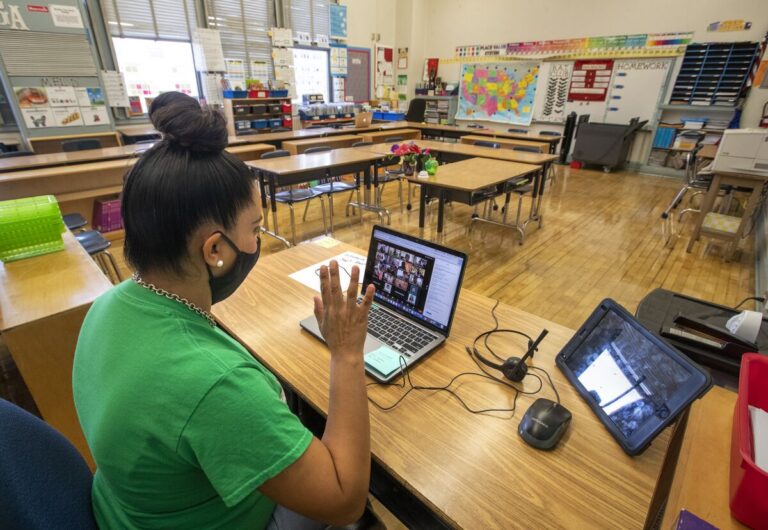Some Teaching Careers Are Not Rewarding Occupations
Some Teaching Careers Are Not Rewarding Occupations. One of the oldest and most prestigious occupations is teaching. Depending on the person’s circumstances, it may be a rewarding or unfulfilling profession.
This article will explore some teaching occupations that may not provide fulfillment or satisfaction to those who pursue them. We’ll examine why these careers are not as gratifying as others and offer advice for those considering such options.
Low Salary And Benefits
Teaching can be a difficult career to pursue, as the salaries and benefits associated with it are often low. In fact, many teachers struggle just to make ends meet while working in their chosen field.
Even though they may have a college degree or certification that should merit higher pay, most are paid less than other professionals with similar qualifications. This makes it hard for them to cover basic living costs such as rent or groceries.
Given these financial constraints, many teachers find themselves relying on additional sources of income. Whether this means taking on extra jobs outside of teaching or dipping into savings, this can create added stress and pressure which further complicates an already demanding profession.
Additionally, some schools offer insufficient resources or lack support from administration; making it even more challenging for educators to perform at their best each day.
These factors contribute to why so many people choose not to stay in teaching long-term despite the intrinsic rewards of the job itself. It is no wonder then that those who remain dedicated to the profession do so out of dedication rather than remuneration alone.
Working In Underfunded Schools
For teachers, working in impoverished schools may sometimes be a difficult experience. Many of these institutions lack the resources needed to adequately furnish classrooms and give students the tools they need to be successful.
This makes it incredibly difficult for teachers in these environments to remain inspired and motivated; they are working tirelessly but not seeing any positive results due to their limited resources. Often times, this means that there is little or no room for professional development within such schools, as funding simply isn’t available.
Without new skills and knowledge, teaching careers in underfunded schools can quickly become stagnant and unfulfilling – leaving educators feeling helpless and frustrated by the state of their profession. In addition to lacking funding, many underfunded school environments also suffer from poor student engagement levels.
With fewer supplies and less interactive activities available compared to more affluent institutions, students may feel disengaged from the lessons being taught – leading them away from gaining an appreciation for learning. As a result, teachers face added pressure when attempting to motivate their students despite having inadequate resources at hand.
It’s clear that teaching in an underfunded school environment presents its own unique set of challenges which can have detrimental effects on both teacher morale and student engagement levels. However, if managed correctly these scenarios still offer educators opportunities to make a real impact on young lives despite resource constraints – making teaching jobs in such settings all the more rewarding.
Lack Of Professional Development Opportunities
The lack of professional development opportunities in teaching careers can be a major deterrent for those considering entering the field. Professional development is essential to any job and offers instructors the chance to expand their knowledge, hone their abilities, and keep up with the latest business trends. Many instructors believe that they are unable to give their children the highest quality education possible without access to these tools.
The availability of professional development opportunities varies greatly depending on the school district or geographic region. In some cases, there may not even be funding available to support professional learning activities. This means that teachers have little choice but to seek out personal funds if they want to attend conferences or workshops outside of regular work hours.
Unfortunately, this creates additional financial burden which can cause further stress and anxiety among educators who already struggle with low pay and other issues related to working in the educational system.
In order for teachers to remain competitive in today’s job market and ensure that they are providing students with a high-quality educational experience, it is essential that appropriate professional development opportunities be made available across all districts regardless of location or budget constraints. With adequate support from administrators, we can help create an environment where teachers feel supported and empowered as professionals while continuing to use their unique skillset and expertise to benefit our young learners.
Unsupportive Administrators And Colleagues
Being a teacher can be a difficult career, especially when faced with unsupportive administrators and colleagues. It’s easy to feel overwhelmed in an environment where those around you don’t understand the reasons why teaching is important or respect your knowledge and experience.
Unsupportive administrators often prioritize administrative tasks over educator support, leading teachers to feel unsupported and unheard. Colleagues who are not invested in their students’ success can become draining for dedicated educators who find themselves needing to pick up the slack of others.
Unsupportive environments also creates pressure on teachers to conform to certain standards which may not be beneficial for student learning. Often times, these pressures come from higher-level staff members that have little understanding of what it takes to effectively teach students. This leaves teachers feeling powerless against such demands and unable to use the best practices they know will benefit their classes.
Additionally, this type of atmosphere can lead to burnout due to lack of appreciation and recognition for hard work put into creating meaningful lessons for students. Teachers need adequate support if they are going to continue doing their job well. Without it, even the most passionate educators might end up feeling defeated by seemingly insurmountable odds.
As a result, providing supportive working conditions should be at the top of any school’s list when striving towards educational excellence. Doing so would ensure that everyone involved in education has access resources necessary to make sure all children receive quality instruction no matter what obstacles stand in their way.
High Stress And Heavy Workload

Unfortunately, teaching is often a high-stress occupation with a heavy workload. As if dealing with unsupportive administrators and colleagues wasn’t enough of a challenge in itself, teachers must also juggle the demands of their students and parents. To make matters worse, educators are expected to perform at an optimal level despite these obstacles.
Here are some additional aspects that can make teaching one of the most difficult but rewarding jobs:
- Long Hours: Many teachers spend much more than the traditional school day on campus, grading papers or preparing lesson plans. This requires great dedication from those who pursue teaching as a career.
- Limited Resources: Teachers may not have access to all the materials they need for classroom activities due to budget cuts or other limitations. Despite this, they still strive to create innovative lessons that will engage their students.
- Stagnant Wages: Even though education is essential for any nation’s economic growth, many teachers do not receive competitive salaries according to national standards. This can be discouraging for those trying to make ends meet while pursuing long-term goals in teaching careers.
Despite these challenges, there are plenty of opportunities for dedicated individuals who wish to impact future generations through teaching occupations. Knowing that each day brings something new makes it possible for someone passionate about education to remain motivated throughout their career journey in spite of any difficulties encountered along the way.
Limited Job Security
Teaching careers are often associated with limited job security. Due to budget constraints and shifts in educational policy, many teachers find themselves out of a job unexpectedly. As such, teaching is not always seen as an ideal choice for those looking for career stability.
Although most countries offer some form of financial support for laid-off educators, the uncertainty can be daunting and cause stress for educators who have invested significant time in their career path.
Job insecurity also has implications beyond finances and mental health; it affects the level of commitment that teachers feel toward their students and curriculum development. Without assurances that they will keep their jobs from year to year, many teachers lack motivation to invest extra effort into planning creative lesson plans or building relationships with students outside the classroom.
This can impact student learning and achievement long-term if instructors are unable to provide adequate attention to their pupils’ needs due to worries about job security.
Given this reality, those considering teaching need to be aware of the potential risks before committing fully to the profession. There are ways to mitigate these issues, like seeking out secure positions within universities or developing skills that make you more valuable in other industries.
Ultimately, understanding the drawbacks of teacher job security is important when making decisions about your future career path.
Classroom Management Challenges

It’s no surprise that teaching can be a difficult and demanding career. Even the most experienced educators are met with unique challenges in their classrooms every day.
From balancing diverse student needs to enforcing classroom rules, here are three of the biggest obstacles teachers must face:
- Establishing expectations for students: Teachers must determine how best to set behavioral guidelines within the classroom while still maintaining an environment in which all students feel respected and valued.
- Creating engaging lesson plans: Crafting activities and lessons that hold students’ interest is a vital part of successful instruction, especially when dealing with younger learners who may have shorter attention spans.
- Keeping up with changing technology: With new technologies emerging constantly, it can be hard for teachers to stay ahead of technological trends, from incorporating online learning platforms into their curricula to using video-conferencing tools like Zoom or Google Meet.
These issues require ongoing effort on the teacher’s part, but ultimately lead to more effective teaching practices and better outcomes for students – making it all worth it!
Difficult Students
Working in a teaching career can be incredibly rewarding, but it also comes with its difficulties. One of the biggest challenges is dealing with difficult students. It requires patience and understanding to remain composed when faced with outbursts or refusal to cooperate.
Teachers must be able to employ strategies that keep classrooms organized while still nurturing students’ individual needs. It’s important for teachers to recognize their own feelings and reactions during interactions that involve difficult students. Acknowledging one’s emotions and taking time away from the situation allows them to take stock of what happened before responding positively.
This helps maintain respectful relationships between teacher and student, even if there are disagreements over specific topics or behaviors. In order to ensure successful outcomes, teachers should create an environment where rules are clear yet flexible enough for exceptions as needed. Establishing expectations early on sets up positive reinforcement for good behavior; this encourages greater participation among all members of the classroom community.
With these measures in place, the energy spent on managing challenging situations will diminish, allowing more room for learning and growth within each student-teacher relationship.
Parental Pressure

When dealing with tough kids, teaching may be a demanding profession. Yet, parental pressure is not the only difficulty teachers have; it also has a significant impact on their professional achievement.
Parents may view education as an investment and expect results to reflect this. They may put high expectations on a student’s grades or progress and become frustrated if they are not met:
- Being asked to give extra time after school hours for tutoring
- Receiving criticism from parents about teaching style
- Feeling pressured by parents to give higher grades than deserved
- Getting caught in the middle between parent-teacher disagreements
It’s important to remember that both teacher and parents have the same goal – providing children with an education so they can reach their full potential. Although there will always be challenges along the way, without cooperation between home and school, these goals cannot be achieved satisfactorily.
With open communication and mutual understanding, all parties involved can work together towards meeting educational objectives successfully.
Emotional And Mental Health Struggles
Teaching is often thought of as a rewarding occupation, yet many teachers feel otherwise. For those who struggle with the emotional and mental demands of their teaching careers, it can be an incredibly draining experience. It’s no wonder that so many educators battle depression, anxiety, and burnout—the pressure to succeed combined with long hours in the classroom takes its toll on even the most dedicated teacher.
The lack of recognition for their hard work only adds more stress to already exhausted teachers. Not only do they have to continuously prove themselves worthy through test scores and student evaluations, but also deal with unreasonable parents or administrators demanding results.
The constant need for approval coupled with never-ending expectations can cause immense frustration and lead to feelings of worthlessness or inadequacy.
It is essential that we acknowledge these struggles and make efforts to support our teachers in any way possible. Giving them access to resources such as therapy programs or professional development opportunities can help reduce the burden they face daily, allowing them to focus on what matters most: providing quality education for students everywhere.
Conclusion
Teaching can be a rewarding career, but it’s not easy. It requires dedication and hard work with little recognition or job security at times.
There are resources available to help teachers manage stress and workloads, strategies for building relationships with colleagues and administrators, and organizations offering professional development opportunities.
By taking advantage of these supports, teachers can make their careers more fulfilling while continuing to provide quality education to students.
Ultimately, teaching is about making a difference in the lives of others – something no other profession offers. With that comes great satisfaction, even if there isn’t always financial reward.







